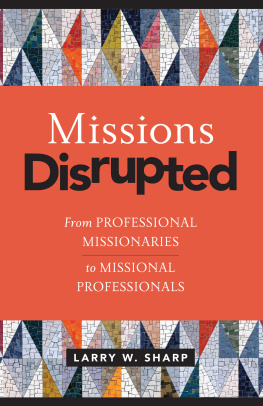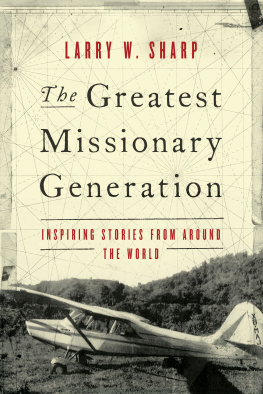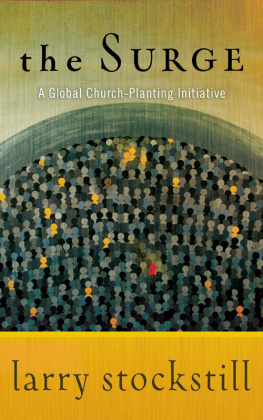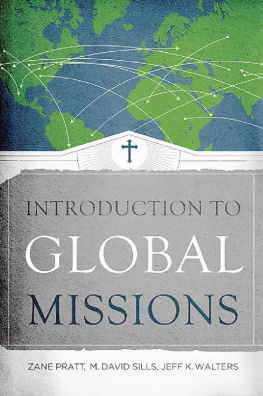Copyright
Missions Disrupted: From Professional Missionaries to Missional Professionals (ebook edition)
2022 Larry Sharp
Published by Hendrickson Publishers
an imprint of Hendrickson Publishing Group
Hendrickson Publishers, LLC
P. O. Box 3473
Peabody, Massachusetts 01961-3473
hendricksonpublishinggroup.com
eISBN 978-1-4964-7161-1
All rights reserved. No part of this book may be reproduced or transmitted in any form or by any means, electronic or mechanical, including photocopying, recording, or by any information storage and retrieval system, without permission in writing from the publisher.
All Scripture quotations, unless otherwise indicated, are taken from the Holy Bible, New International Version, NIV. Copyright 1973, 1978, 1984, 2011 by Biblica, Inc. Used by permission of Zondervan. All rights reserved worldwide. zondervan.com. The NIV and New International Version are trademarks registered in the United States Patent and Trademark Office by Biblica, Inc.
Scripture quotations marked (NLT) are taken from the Holy Bible, New Living Translation, copyright 1996, 2004, 2015 by Tyndale House Foundation. Used by permission of Tyndale House Publishers, Carol Stream, Illinois 60188. All rights reserved.
Scripture quotations marked (ESV) are taken from the Holy Bible, English Standard Version (ESV), copyright 2001 by Crossway, a publishing ministry of Good News Publishers. Used by permission. All rights reserved.
Scripture quotations marked (TLB) are taken from The Living Bible copyright 1971. Used by permission of Tyndale House Publishers, a Division of Tyndale House Ministries, Carol Stream, Illinois 60188. All rights reserved.
Due to technical issues, this ebook may not contain all of the images or diagrams in the original print edition of the work. In addition, adapting the print edition to the eBook format may require some other layout and feature changes to be made.
First ebook edition June 2022
Library of Congress Control Number: 2022933996
Preface
An intelligent man is open to new ideas. In fact he looks for them.
King Solomon (Prov. 18:15 TLB)
The purpose of this book is to provide compelling evidence to recalibrate the way we think about how God is working in the twenty-first-century world. The narrative for that shift lies in the stories of lives and communities transformed through men and women living out their faith in the workplace. They are not professional missionaries, but they are missional professionals.
Leo Tolstoy wrote that the only question important to us is, what shall we do and how shall we live? The central presupposition is that God is at work in the world in accordance with the definition of missio Deithe sending of Godand followers of Jesus are first and foremost called to him. To quote Os Guinness, Our secondary calling, considering who God is as sovereign, is that everyone, everywhere, and in everything should think, speak, live and act entirely for him.
In short, this means that our work matters to God because he made us in his image as beings with unique abilities, gifts, and characteristics that bring creative glory to God. All such work is in the spirit of Pauls letter to the Colossians: Whatever you do, work at it with all your heart, as working for the Lord, not for human masters (Col. 3:23). Practically speaking, if God bestowed gifts to a person to be a farmer, then that farmer works for the glory of God; if as a business entrepreneur, that businessperson too works for the glory of God. Its the same for a teacher, a nurse practitioner, or an engineer.
There is no higher calling than serving Gods mission using the resources given to us, and the secondary calling gives a dignity and spiritual significance to everyday work. In the spirit of the Reformers, William Tyndale wrote, If our desire is to please God, pouring water, washing dishes, cobbling shoes, and preaching the Word is all one (the support theology for this is summarized in chapter 1).
In our ever-changing times, we can look at Disruptive Innovation Theory as a practical support theory for the changes were seeing in missional thinking in the church and in the hearts of the current generation of believers. The proposition here is that change will come as a diffusion of innovation, meaning on the tails of the normal curve via early adopters who are willing to see things differently and adjust to a new way of doing missions. According to this theory, church and mission leaders need to work with those in the marketplace to creatively realize how they can proclaim the gospel through godly living in the workplace.
The real-life narratives that you will read in chapters 6, 7, and 8 show how followers of Christ have combined their God-given gifts, talents, and work experiences with their faith and sharing the gospel in word and deed. They include those working overseas, citizens of other countries, and those who migrated abroad as entrepreneurs to start what are now successful businesses, bringing glory to God and their communities through their talents. They include those from a wide range of professions and skills: musicians, health-care providers, engineers, agriculturalists, business entrepreneurs, English teachers, coffee gurus, and many more.
If you already understand the apologetics of faith and work, as well as disruptive business theory, you may find some of this material redundant. In this case, I encourage you to go immediately to the stories (chapters 6, 7, and 8) to enjoy reading about God at work in other cultures via the workplace. If questions arise concerning theology and theory, you can return to the apologetics in chapters 1 through 5 for the rationale for using your gifts in the marketplace.
As pastor, professor, and author J. D. Payne writes, Kingdom citizens should glorify God by serving the nations with differing skills and advocating for social justice issues. With this perspective in mind, we direct our attention to God as a sending God, our primary and secondary calling, disruption via the diffusion of innovation, and some models to emulate from a wide range of professions. The hoped-for conclusion is that all of Gods people in the twenty-first century will discover and then take up their place in missio Dei.
Note: While all of the following stories are real, because of security considerations, many individuals and companies featured in this book have requested the use of pseudonyms for any details that could identify them.
NOTES
. Os Guinness, The Call (Nashville: W Publishing Group, 2003), 31.
. Denny Spitters and Matthew Ellison, eds., Conversations on When Everything Is Missions: Recovering the Mission of The Church (Albuquerque, NM: Sixteen:Fifteen, 2020), 18.
Acknowledgments
No book is ever truly written alone, and I have found that to be true for me.
I am immensely grateful for those who helped extend my understanding of the faith and work movement, such as Albert Erisman, co-chair of the Theology of Work Project. During my time as a Pollard Research Fellowship Scholar, he encouraged me and shared some of his writings on the subject with me.
Much of my understanding of Business as Mission is because I have been privileged to associate with leaders in the movement who have challenged and mentored me, such as Mats Tunehag, Patrick Lai, Peter Shaukat, and Mike Baer among others. I also want to thank my colleagues in the BAM consulting group, IBEC Ventures, who contributed many ideas for this book as we learned together. Thanks especially to Ken Leahy, Gary Willett, Robert Johnstone, and Robert Bush.










